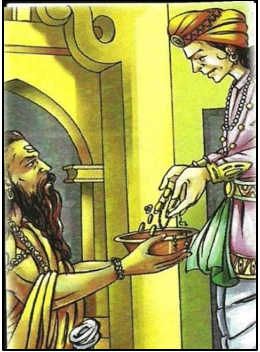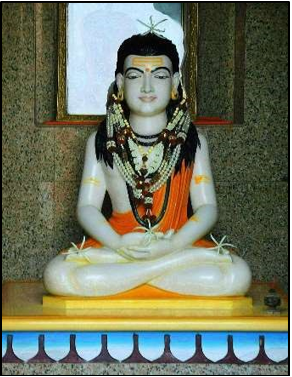Talk:Vairāgya: Has no Interest Fame, Power, Riches or Happiness
By Vishal Agarwal
Having immersed himself in the Īshvara – the true source of immortality, wealth, and happiness, the Bhakti Yogī has no interest left in worldly treasures, glory, or joys. He does not worry about his gains or losses. He is perpetually wealthy, glorious, and happy in the company of the Īshvara. The story of Tyāgarāja has already been narrated above in Section 11.5.
He who is devoted to Bhagavān Sri Hari, the Īshvara and repository of the supreme good, sports in the ocean of nectar. He cannot feel drawn towards the enjoyment either of this world or the next, which is like the turbid water of a muddy pool. Bhāgavata Purāṇa 6.12.22 It is Bhagavān alone who provides us with all enjoyments. No one else can give us happiness. Shiva Purāṇa 1.16.103 The Bhakta prefers to reside in isolated places, frees himself of worldly bonds, overcomes the bondage of the three guṇas, and does not worry about what he has, or what he would like to acquire. Nārada Bhakti Sūtra 47
The Bhakti Yogī rejects not merely the fame, glory, wealth, etc., of this world but also those of heaven instead of whatever the Īshvara wishes for Him. For example, in the Mahābhārata, Upamanyu, an ardent Bhakta of Shiva, says-
At Shankara’s command, I am prepared to be reborn even as a worm or a grasshopper. But Indra, I have no desire even for the rulership of the three worlds that you may offer to me as a gift. Mahābhārata 13.14.186
The following stories show the complete disinterest or attraction of true Bhakta-s towards mundane things.
Story – Haridās Thākur Sings for the Emperor of the Universe
Emperor Akbar ruled a vast Empire over the Indian subcontinent for 49 years (1556-1605 CE). He gathered in his court nine jewels – men who excelled in their respective fields. Among them was Tansen, the legendary singer.
One day, Akbar commented, “Tansen, I think there never was, and there never will be a greater singer than you.” Tansen replied, to his surprise, “Your majesty, I dare say that my Guru Haridas (1480 – 1575CE) is a far superior singer than I am.” Akbar asked Tansen to get his Guru to the royal court to sing. But Tansen said, “My Guru does not bow before any king. He cannot be tempted by wealth and cannot be persuaded by threats to sing for you. He does not sing if requested. He sings only when he wishes. And he prefers to live in a hut in Nidhivana on the banks of Yamuna not very far from the royal palace. To hear him, we must go early in the morning when he prays to Krishna on the banks of Yamuna.”
Akbar and Tansen accordingly went to the bank of Yamuna early in the morning when it was still dark. Guru Haridas came out of his cot and after his ablutions, he sat on the river bank and started chanting hymns to Krishna. So beautifully did he sing that the Emperor was mesmerized. The broken ghats of the river appeared to him as if they were glittering with bejeweled gems. After the Guru had finished his devotional singing, he turned around and noticed the Emperor and Tansen, his disciple. Akbar pleaded with Guru Haridas to visit his royal court, but Haridas declined and went back to his hut.
When Akbar and Tansen reached the palace after the meeting, the Emperor asked Tansen, “How can your Guru sing so melodiously? Do you know the secret?” Tansen smiled and replied, “Emperor, I sing only for the ruler of Hindustan for the sake of my livelihood. Whereas my Guru sings only to please that ruler who is the Emperor of the entire Universe.”
Story- Divine Darshan Makes Shridhar Swami Lose Attraction for Worldly Fame and Treasures
Several hundred years ago, there lived a very scholarly Vaishnav Pandit Shridhar Swami. He toured the country and defeated many scholars in debates on Hindu scriptures. One night, he was returning to his home, victorious from a debate and carrying the prize money.
Suddenly, a gang of robbers waylaid him and asked him to part with his wealth. Shridhar Swami closed his eyes and worshipped Bhagavan Rama to protect him from being robbed. In an instant, a pair of handsome, divine Princes (Rama and Lakshmana) appeared in front of the robbers. Terrified, the robbers threw their weapons away and fell at the feet of Shridhar Swami, asking him for forgiveness. Shridhar Swami realized that these Princes were none other than Bhagavan Rama and Lakshmana, who had appeared to protect their devotees. He forgave the robbers but regretted deeply that the merciful Bhagavan took the trouble to save his devotee from being robbed of mere wealth.
Shridhar Swami now developed an indifference towards personal glory and wealth. He renounced his family and went to Varanasi. There, he met Swami Paramamanda, who gave him the Shri Narasimha mantra and the vows of Sannyāsa[1].
Story: Vedanta Deshikā Throws Away Gold Coins
In the 14th century lived a great saint and scholar named Vedanta Deshika. In his lifetime, he wrote over 100 books explaining the principles of the philosophy of Shri Ramanujacharya. Many wealthy merchants and kings admired and respected him, and offered him a lot of wealth. But Deshika declined all material favors and preferred to live the austere and simple life of a virtuous Brahmana, as recommended in Hindu scriptures.
Every day, Vedanta Deshika begged for his food from door to door. A rich merchant thought, “Deshika will not accept my gold. Perhaps, I should mix gold coins in the rice that I give to him today.”
When Deshika reached home, he said to his wife, “Today, a man has mixed some worms in the rice that he put in my begging bowl. Please separate and throw them away so that I can eat the remaining food.” His devoted wife sifted the gold coins and threw them out of their hut, and then served the rice to her saintly husband.”
Story- Gorakhnāth Clarifies What is a Bigger Sacrifice
“Once a householder came to pay his respects to the Maha Yogi Goraksha with folded hands, he said, “Oh Respected One, your sacrifice is great, for you have given up the whole world for Īshvara.” Goraksha replied with folded hands, “Oh Respected One, your sacrifice is greater than mine for you have given up the infinite Īshvara for this finite world.[2]”
Story: Hanuman Looks for Ram inside Precious Pearls
After the coronation ceremony of King Rama in Ayodhya was over, Shri Rama received a lot of expensive presents from other rulers of the world. He distributed these presents, which included precious pearls, diamonds, gems, etc., to his friends – the Vanaras, King Vibhishana of Lanka, and others who had helped him defeat Ravana. Hanuman was gifted a necklace of very rare and precious pearls. Everyone was overjoyed upon receiving their gifts. They started comparing their gifts with those of others, and there was a lot of excitement in the air.
Suddenly, someone noticed that Hanuman was sitting in a corner. He was biting the pearls of the necklace, one by one, and then discarding the pieces in a heap of trash. When asked to explain his strange action of destroying the necklace of expensive pearls, he replied, “The only thing I value is my Bhagavan Shri Rama. I do not find him inside these pearls. Therefore, they are worthless to me.[3]”
References[edit]
- ↑ Chaitanya, Devendra, and Sudarshan Singh Chakra. Drishtaanta Mahaasaagar (in Hindi). Randhir Prakashan, 2013, p. 525. Haridwar.
- ↑ Siddhanath, Yogiraj Satgurunath. Wings to Freedom. Alight Publications, 2009, p. 164. Union City.
- ↑ Nābhādāsa (Nābhā Goswāmī). Śrī Bhaktamāla with Commentary by Śrī Priyadāsa. Translated by Bhūmipati Dāsa, edited by Pūrṇaprajna Dāsa, Rasbihari Lal and Sons, 2017. Vrindavan, India.




